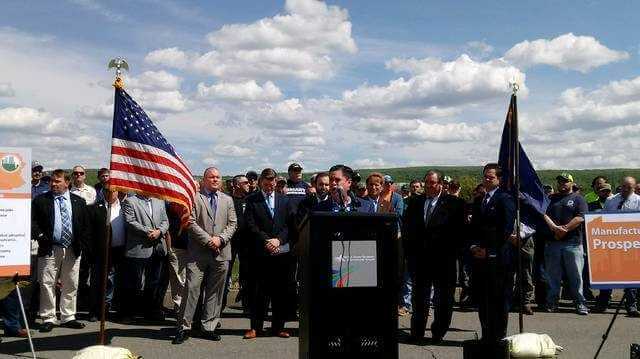
Pittston Township, Luzerne County, PA -
Backed by a crowd of union supporters, state Rep. Aaron Kaufer and state Sen. John Yudichak gathered Thursday to promote proposed legislation aimed at luring a “world-class” petrochemical manufacturing plant to the Wilkes-Barre/Scranton area.
Kaufer's House Bill 1100 and a companion bill to be introduced in the Senate would mirror the Pennsylvania Resource Manufacturing Tax Credit that attracted a Royal Dutch Shell petrochemical “cracker” plant to Beaver County near Pittsburgh, the lawmakers said during the event at the Wilkes-Barre/Scranton International Airport.
During a Thursday gathering at the Wilkes-Barre/Scranton International Airport, Penn's Northeast CEO John Augustine is seen speaking in support of bipartisan legislation aimed at attracting a world-class petrochemical manufacturing plant to the area. - Jennifer Learn-Andes | Times Leader
Once operational, the Shell plant will convert ethane and ethylene to make plastic and employ 600 workers, said Kaufer, R-Kingston. In addition, 6,500 trades workers are constructing the plant, he said.
Kaufer's proposed bill, which is in committee, would provide incentives to manufacturers that spend at least $1 billion constructing and bringing into service a facility creating at least 1,000 full-time jobs.
Under his proposal, a manufacturer would receive $1 for every $5 in tax revenue, he said, describing it as a “steady stream of revenue” for the state and not a tax abatement.
With tapping of the region's “abundant, affordable and accessible” natural gas, the area should take advantage of the “downstream” processing opportunities for world-wide distribution, Kaufer said.
“If we do nothing and allow this opportunity to slip through our hands, we'd lose out on the economic impact, the tax revenue and the high-paying jobs for our area and beyond,” Kaufer said. “This is our generation's opportunity at a second chance for the things we got wrong with the coal industry, but this time, we will get it right.”
Different gas types
A local plant would not compete with the Beaver County one because the natural gas is “wet” in Southwest Pennsylvania and “dry” and primarily methane here, Kaufer said.
“Methane has its own value in manufacturing petrochemicals and fertilizers,” he said, noting this region has an available transportation network to “ship to the world.”
Yudichak, D-Nanticoke, said Thursday's event was meant to present a “united front” to Harrisburg and the rest of the country showing the region's Democrats, Republicans, unions and business leaders are “all in” to create family-sustaining jobs.
“Today we stand united with the building trades unions in the fight to make Northeastern Pennsylvania the eastern hub of the petrochemical manufacturing industry in Pennsylvania,” Yudichak said.
Approximately 5,000 new manufacturing jobs have been added in the Luzerne/Lackawanna counties corridor in the last four years, and that job count will double in the next four years if the plan succeeds, Yudichak predicted.
Bigger package
Kaufer's bill is part of an eight-bill legislative package called “Energize PA” that also encourages companies to develop abandoned commercial sites and expand access to natural gas.
Some highlights of the seven other bill initiatives proposed, according to a review of the House co-sponsorship memoranda: